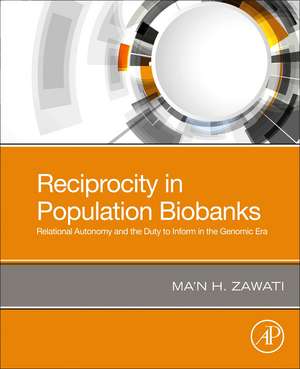Reciprocity in Population Biobanks: Relational Autonomy and the Duty to Inform in the Genomic Era
Autor Ma’n H. Zawatien Limba Engleză Paperback – 23 sep 2021
In carrying out this analysis, this book pays special attention to alternative approaches and ways researchers, public health officials, and judicial bodies might interact in years to come. In other words, implementing an understanding of relational autonomy that acknowledges and sustains the multilateral relationships found in genomic research without compromising the rights of participants. In short, this book proposes a reconceived duty to inform for researchers and a new standard of disclosure that is more meaningful and impactful for research participants and researchers.
- Examines the limitations individualistic autonomy faces in the context of gene and population biobanks
- Proposes a reconceived duty to inform for researchers and a new standard of disclosure more meaningful to genomic research participants
- Suggests ways researchers, public health officials, and judicial bodies might interact to drive genomic research while still protecting research participants
Preț: 594.04 lei
Preț vechi: 762.88 lei
-22% Nou
Puncte Express: 891
Preț estimativ în valută:
113.66€ • 118.69$ • 93.86£
113.66€ • 118.69$ • 93.86£
Carte tipărită la comandă
Livrare economică 08-22 aprilie
Preluare comenzi: 021 569.72.76
Specificații
ISBN-13: 9780323912860
ISBN-10: 0323912869
Pagini: 202
Ilustrații: 20 illustrations (10 in full color)
Dimensiuni: 191 x 235 mm
Editura: ELSEVIER SCIENCE
ISBN-10: 0323912869
Pagini: 202
Ilustrații: 20 illustrations (10 in full color)
Dimensiuni: 191 x 235 mm
Editura: ELSEVIER SCIENCE
Cuprins
1. From Paternalism to the Individualistic Conception of Autonomy: A Brief Overview of The Evolution of the Medical Duty to Inform in the 20th Century
2. Characteristics of Population Biobanks
3. The Duty to Inform of Researchers in Population Biobanks
4. Limitations of The Individualistic Conception of Autonomy in Population Biobanking
5. The Concept of Reciprocity: Origins and Key Elements
6. Toward a Reciprocity-Based Relational Autonomy for Population Biobanks: Advantages and Limitations
2. Characteristics of Population Biobanks
3. The Duty to Inform of Researchers in Population Biobanks
4. Limitations of The Individualistic Conception of Autonomy in Population Biobanking
5. The Concept of Reciprocity: Origins and Key Elements
6. Toward a Reciprocity-Based Relational Autonomy for Population Biobanks: Advantages and Limitations
